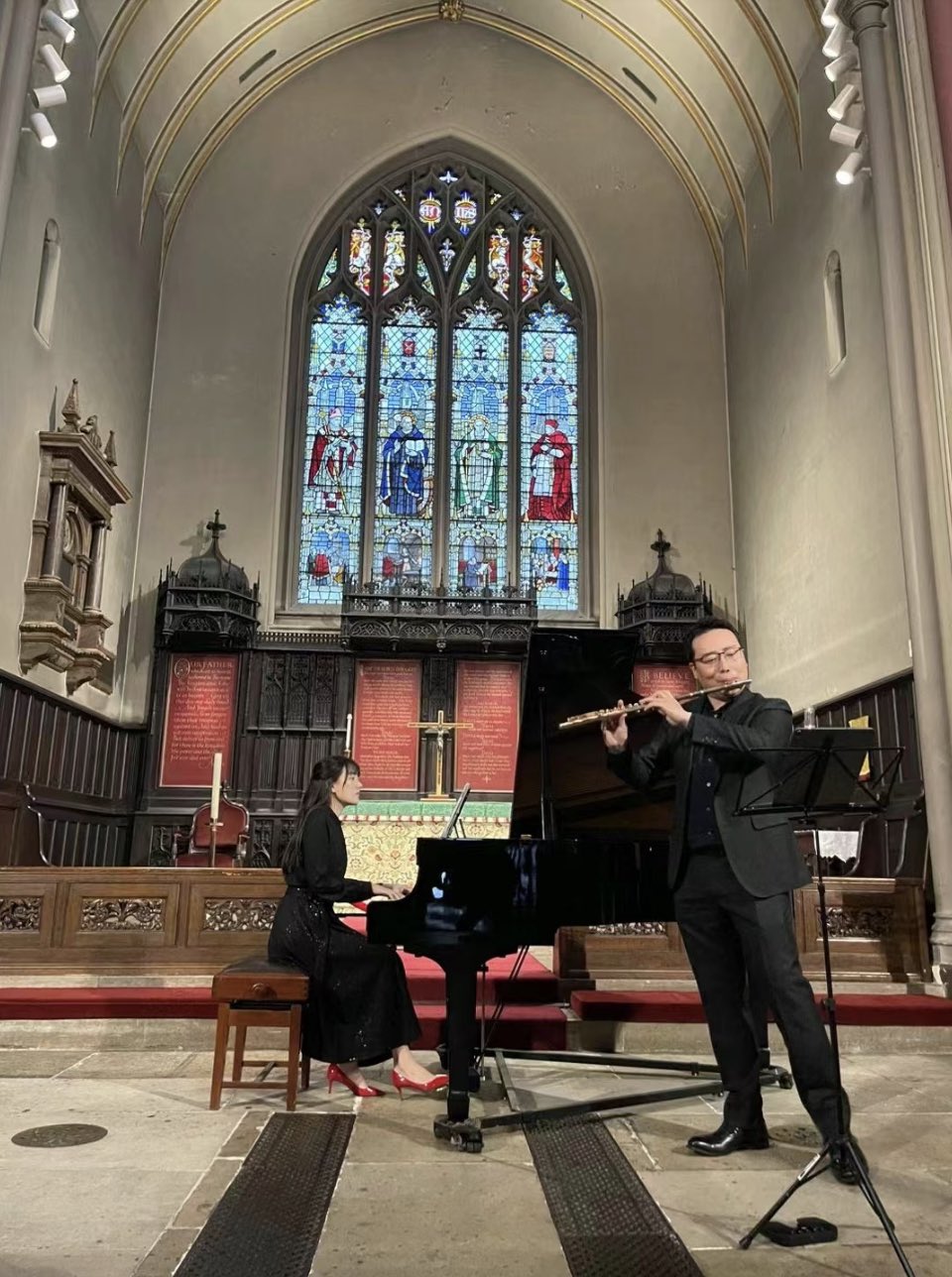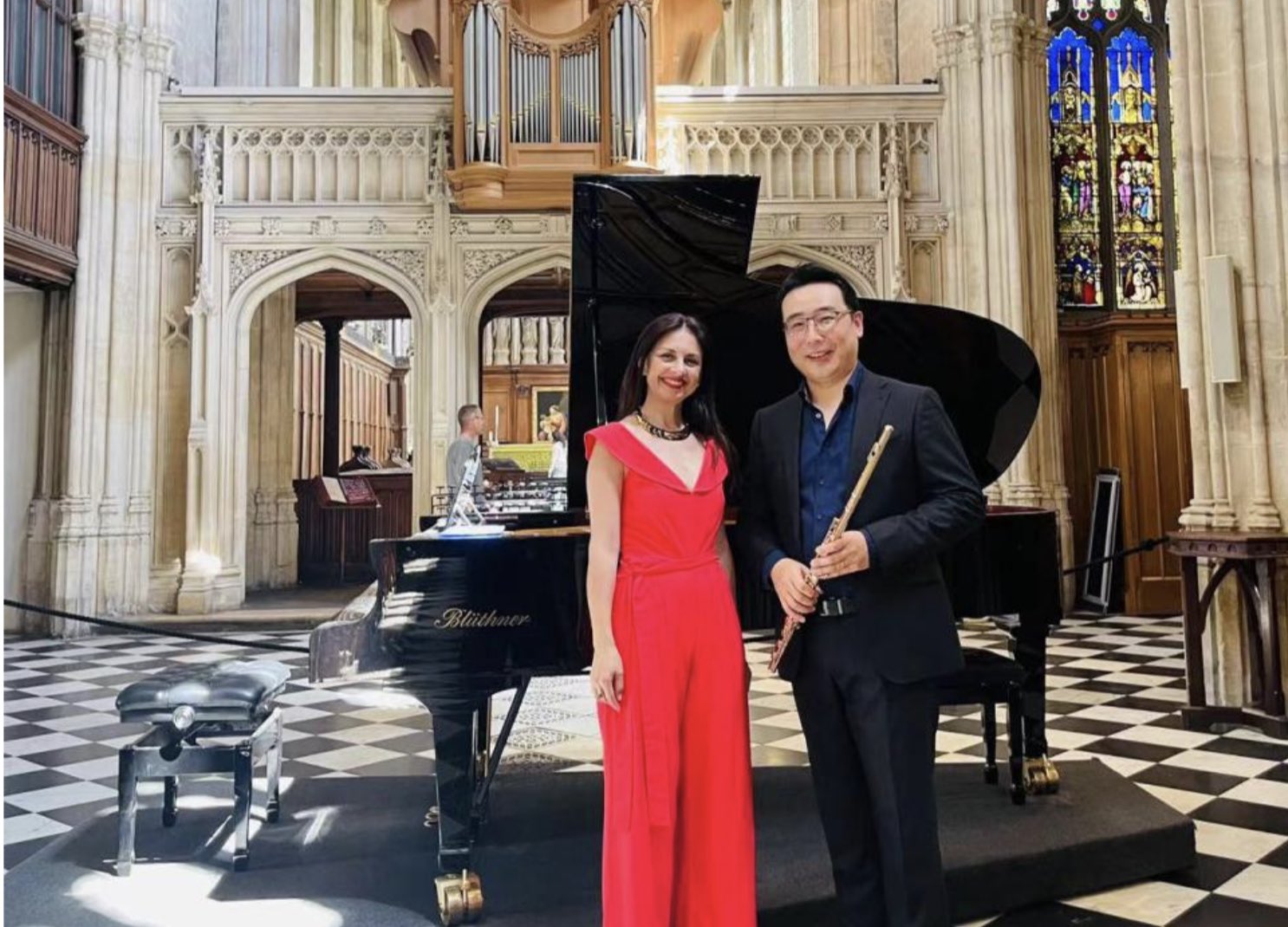In the hushed stillness of evening, Feng Di would drift to sleep to the sound of his father’s flute. This nightly serenade was more than a lullaby; it was the genesis of a profound musical journey. Today, Feng Di stands as a luminary in the world of flute performance, weaving the rich traditions of the French flute school with his own artistic flair.
An accomplished flutist, conductor, and professor of chamber music, Feng Di’s ascent in the world of classical music is a testament to his dedication and the powerful influence of the French flute school. Born into a musical family, Feng’s early life was saturated with melodies and harmonies. “Music was like an extra language to us, one we all spoke,” Feng reminisces. This familial bond with music laid the foundation for his illustrious career, marked by both performance and pedagogy.
His formal training at the École Normale de Musique de Paris under the tutelage of the renowned Professor Pierre-Yves Artaud was pivotal. “Studying with Professor Artaud was transformative. He focuses on introducing many modern playing techniques to flute playing, such as: multiphonics, aeolian sound, percussive sounds, tongue ram, singing and playing simultaneously, key clicks, glissando, flutter tonguing, whistle tones, microtones, circular breathing, air tones, and key slaps and glissandi,” Feng reflects. This education imbued Feng with the essence of the French flute school combined with a fresh and modern approach.
The French flute school’s origins are rooted in the Paris Conservatoire and the craftsmanship of Louis Lot, whose flutes were renowned for their superior quality. Jean-Louis Tulou, a key figure during this period, established the foundational techniques and tonal ideals that would characterize the school. The late 19th and early 20th centuries saw further evolution under Paul Taffanel, often hailed as the father of modern flute playing. His student, Philippe Gaubert, continued this legacy, and his work emphasized color changes and emotional expression.
Feng Di’s acclaimed international performances, including his recent “La Romance” series in England’s historic churches, echo this rich heritage. Collaborating with pianists like Stefania Passamonte, Feng brought to life the emotive and technically demanding works of French Romantic composers. Pieces like Saint-Saëns’ “Romance” and Fauré’s “Fantaisie” showcased not only his virtuosity but also his profound interpretative skills. “Each performance is a dialogue between the past and present, a conversation with the masters who came before us,” Feng says.
In a performance that was nothing short of mesmerizing, Feng Di showcased exceptional breath control and masterful tone-shaping in his rendition of “Romance.” His command over the high register was particularly impressive, with each note rendered in a silky, delicate tone that was rich in layers. The sound of the flute, handled with meticulous care, conveyed the profound romantic sentiment of the piece with remarkable finesse.
Feng’s interpretation of Gabriel Fauré’s “Sicilienne” further demonstrated his impressive timbre and dynamic range. His playing was both delicate and expressive, effortlessly transitioning between registers and volumes while capturing the elegance and softness intrinsic to Fauré’s composition. The mid-to-low register of the flute was particularly notable for its round, full tone, imbued with deep emotion. The pianissimo passages were especially poignant, so hushed that even the faintest sound, like the drop of a pin, could be heard in the room.
The performance of Faure’s “Fantasie” was a testament to Feng’s technical prowess and musical depth. The piece, known for its demanding technical and interpretive challenges, saw Feng navigate its fast passages with impressive flexibility and powerful double-tonguing. His skillful use of rubato in the adagio sections ensured a seamless flow between notes, enhancing the overall continuity of the performance.
The concert culminated in a spectacular finale with George Enescu’s “Lento e Allegro.” This demanding work, characterized by its rapid fingering, complex rhythms, and expansive pitch range, was brought to life with Feng’s remarkable dexterity and emotional depth. The lento sections were rendered with a soft, delicate tone and profound expressiveness, while the allegro passages were executed with precision and agility. Feng’s use of a gold flute added a warm yet commanding fortissimo in the low register, rounding off the performance with impressive impact.

In addition to his performance career, Feng’s contributions as a teacher are noteworthy. At the London Performing Academy of Music, he imparts the intricacies of flute playing to a new generation. “Teaching allows me to pass on the traditions of the French flute school while encouraging students to find their unique voice,” he explains.
The French flute school’s influence extends beyond France, profoundly impacting British flute performance. British flutists such as William Bennett and James Galway, both of whom studied in France, have been instrumental in integrating French techniques and styles into the British tradition. This fusion has enriched the global flute repertoire and performance practice.
Feng acknowledges this cross-cultural exchange: “The British flute school has absorbed and reinterpreted the French approach, creating a vibrant and diverse flute culture.” This blending of traditions has led to innovative performances and new compositions that push the boundaries of flute music.
Looking forward, Feng sees a bright future for flute performance in Britain and beyond. “There’s a growing appreciation for the flute’s expressive potential across various musical genres,” he notes. This versatility is evident as contemporary flutists explore genres such as jazz, rock, and electronic music, expanding the instrument’s traditional boundaries.
As an ambassador of the storied tradition of French flute, Feng Di is committed to its preservation and evolution. His performances and teachings embody the delicate balance between technical precision and emotional expression, a core tenet of the French school. “In my performances, I strive to pursue the emotional transmission of each note, and strive to make every note full of vitality and appeal,” he says.
In the ever-evolving world of classical music, Feng Di stands as a bridge between the past and the future, honoring the legacy of the French flute school while charting new paths for the next generation of flutists. His journey from a child lulled by his father’s flute to an internationally acclaimed artist is a testament to the enduring power of music and the rich traditions that shape it. As he continues to perform and teach, Feng Di ensures that the melodies of the French flute school will resonate for generations to come.







